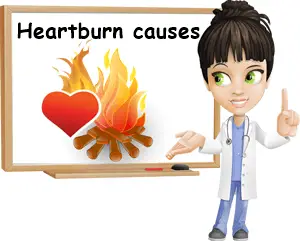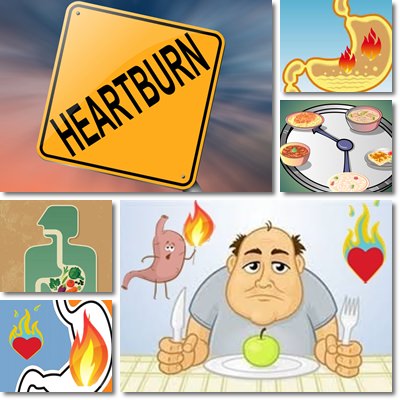Heartburn is a symptom characterized by a burning sensation in the upper abdomen, middle of the chest or throat. It is caused by excess stomach acid that is regurgitated and rises into the esophagus, causing irritation and pain in the form of a strong burning sensation.
Heartburn that occurs more than occasionally is often a sign of gastroesophageal reflux disease. Complications such as laryngospasms, asthma attacks or Barrett’s esophagus may occur in people who experience heartburn regularly.
What is heartburn?
Heartburn is not a disease in itself, but a symptom of one or more conditions primarily affecting the gastrointestinal tract. It may occur either as a singular symptom, independent of acid reflux disease, irritable bowel syndrome or other conditions of the gastrointestinal tract, in which case it is an occasional occurrence.
Similarly, it may occur regularly and be accompanied by other symptoms of a similar nature, in which case it indicates a gastrointestinal condition such as GERD, irritable bowel syndrome, gastritis, peptic ulcer and so on.

How does heartburn occur?
In the same manner as acid reflux. Stomach contents containing mostly gastric acid escape the stomach and flow back into the esophagus, sometimes reaching the back of the mouth. This causes the sensitive mucosas of the esophagus to become irritated, resulting in the typical burning sensation.
When the gastric acids reaches the back of the mouth, we may notice a highly acidic, sour taste. In other words, it’s because of acid reflux that we experience heartburn.
What causes heartburn?
Most of the things that trigger GERD and acid reflux lead to heartburn as well, especially considering they occur in the exact same manner. The difference is that heartburn is the name for the pain and burning feeling caused by the acid rising into the throat, acid reflux is what we call the actual rising of the stomach acid in the throat, while GERD is the condition characterized by symptoms such as heartburn, acid reflux, stomach pain, nausea etc.
Most common causes Of Heartburn
1) Dysfunctions at the level of the esophagus
The stomach is closed up by a muscle called lower esophageal sphincter whose function is to prevent food and gastric acid from rising back into the esophagus.
There are instances when this muscle is too loose or there isn’t sufficient pressure in to keep it closed. If this happens, stomach contents can escape into the esophagus and cause acid reflux which results in a burning sensation in the stomach, chest or throat (heartburn).
Other causes of acid reflux that can lead to the experience of heartburn include: hiatal hernia, motility problems with the esophageal muscles, stomach prolapse, slow emptying of the stomach etc.

2) Increased stomach acidity
Having too much stomach acid (or gastric acid) is more likely to lead to acid reflux and cause heartburn and other symptoms. An increased production of stomach acid can be treated with a better diet and acid reflux medication such as proton pump inhibitors.
3) Medicines
Antibiotics, ibuprofen and other pain relievers, corticosteroids and any type of medication really can cause heartburn. Taking medicines for longer periods of time can lead to more severe heartburn, either as a result of irritation of the stomach lining or through a rebound effect (such as in the case of proton pump inhibitors).
4) Excess weight and overeating
When we eat too much, we are filling up our stomach with food, increasing our chances of stomach contents escaping into the esophagus and getting acid reflux and heartburn. And being overweight or obese means we are most likely overeating.
5) Heavy or large meals
Even if we don’t usually fill up on food until we can’t breathe, having even one large meal can lead to heartburn. Eating heavy meals, rich in deep fried foods, meat and cold meats, matured cheeses, mayonnaise and so on, causes acidity and will most likely lead to heartburn.
6) Alcohol, fizzy drinks, coffee and some teas
Alcoholic beverages irritate the esophagus, causing heartburn. Fizzy drinks and carbonated beverages and coffee can cause acid reflux and result in heartburn as well. White, black and green tea, all rich in caffeine, theine and other stimulants, may irritate the esophagus and the stomach lining.
7) Pregnancy
Hormonal changes during pregnancy can increase our stomach’s production of gastric acid. The growing belly can push the stomach upwards, making it easier for stomach contents to escape into the esophagus and cause heartburn.
8) Spicy and deep-fried foods
Spicy foods (spicy peppers, wasabi, pepper) irritate both the esophagus and the stomach, causing acid reflux and heartburn. Even other types of spices can cause heartburn when consumed in excess. For instance, I had really bad heartburn the other day when I made some chicken thighs with lots of thyme.
9) Certain foods
Tomato sauce, citrus fruits, garlic, onions, leek, even cabbage or cauliflower (for some people), chips, doughnuts, biscuits or cookies rich in butter, pastry products and baked goods, margarine-rich sweets, macaroni and cheese, milk, fermented dairy, milk shakes, sour cream, whipped cream, nuggets, mayonnaise, oily salad dressings and most processed, pre-cooked foods can be problematic and cause acid reflux and heartburn.
10) Lying down or bending soon after eating
It is never a good idea to lie down in bed after a meal, bend down or lift things, especially heavy weights or even sit down in a chair or on the sofa.
Lying down allows the gastric acids to flow back into the esophagus, while bending or lifting things creates pressure and the stomach contents may escape into the esophagus, causing acid reflux and heartburn.
11) Smoking. According to research, smoking can trigger gastroesophageal reflux and worsen existing GERD symptoms significantly, heartburn included.
Heartburn or chest pain?
Many people suffering from heartburn mistake it for chest pain (angina) and fear they are having a heart attack. This is because heartburn in itself gives the impression the pain and burning are coming from the heart. This is what heartburn it feels like:
1) Pain and burning feeling in the middle of the chest.
2) Pain and burning sensation at the level of the stomach, in the upper part of the abdomen.
3) Pain and burning in the throat that can be felt as far up as the back of the mouth.
When is heartburn not heartburn?
Seek medical help if you experience any of the following symptoms:
1) You have pain in the left arm.
2) Pain radiates in the neck or jaw.
3) You experience breathing difficulties.
4) You feel nauseated or dizzy.
Heartburn Treatment and solutions
How to manage heartburn?
Generally, the same remedies that relieve acid reflux can relieve heartburn as well (see GERD treatment and remedies). Depending on the frequency and severity of your symptoms, you may find relief in one or more of the following tips, remedies and treatment options:
1) Avoid problematic foods
Such as fatty or oily foods, processed, pre-cooked or junk food, deep-fried foods, spices, tomatoes and tomato sauce, mayonnaise, butter or margarine-rich sweets, dairy products, fermented cheeses in particular, citrus fruits, onions, garlic, cabbage and any food that may prove problematic for you in particular.
Avoiding foods that cause acidity is a sure way to prevent heartburn. See what foods to eat and to avoid for acid reflux.
2) Avoid problematic beverages
Such as alcoholic beverages, carbonated drinks, coffee, caffeinated beverages, including energy drinks, and green tea and black tea, at least temporarily.
3) Eat small meals often
Controlling portion size means we don’t fill up too much and our stomach has the space it needs to digest food properly, without gastric acid escaping into the esophagus. Eat at least 3 hours before going to sleep.
4) Maintain a healthy weight
Being overweight may lead to physical changes that can encourage heartburn. Moreover, excess weight is often a result of overeating, which implies the consumption of high amounts of not so healthy foods that can easily cause heartburn.
5) Avoid lifting, bending or lying down after eating
Lifting creates pressure on the stomach, bending encourage gastric acid to escape into the esophagus, while lying down before digesting leads to stomach contents flowing back into the throat.
6) Keep active
Being active can mean as little as walking around, but can help a lot. Taking a walk instead of lying down after eating encourage digestion and can prevent heartburn. Moreover, keeping active helps us maintain a steady, healthy weight.
7) Avoid cigarette smoke and eat in
Smoking is known to cause acid reflux and heartburn and worsen GERD symptoms. Eating out is problematic because we don’t have much choice of healthy food that won’t upset our stomach.
8) Write down what you eat and how your symptoms progress
Keeping track of what we eat can help up identify foods and beverages that are problematic for us, as well as provide us with insight with regard to our symptoms.
9) Antacids
Heartburn can be relieved with the help of antacids, but they should be used occasionally. Proton pump inhibitors may be prescribed if your doctor suspects your heartburn is caused by gastroesophageal reflux disease.
10) Drink plenty of water
Drinking water helps wash down stomach acid and relieve pain. Some people may find relief in still water, others may find sparkling water helps better wash down stomach juices rising in the esophagus.
11) Maintain a good sleeping position
When heartburn is caused by acid reflux, it might be best to sleep in a slightly elevated position to prevent stomach contents from going back into the esophagus and causing a burning sensation. What do you do when you have heartburn?
